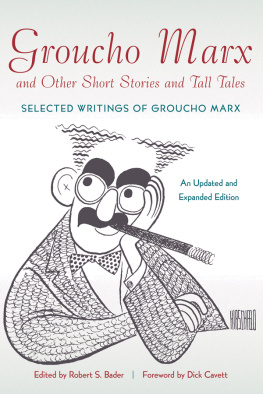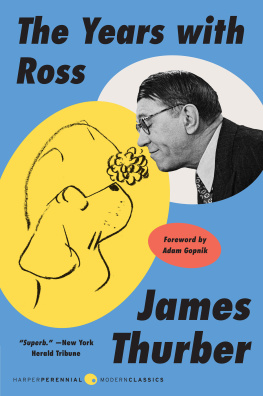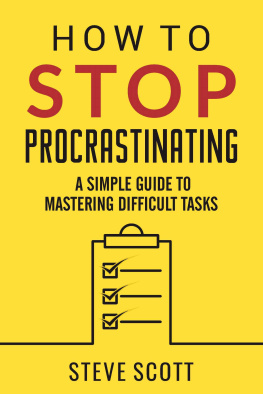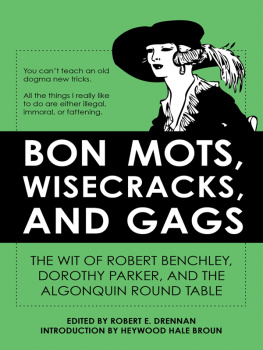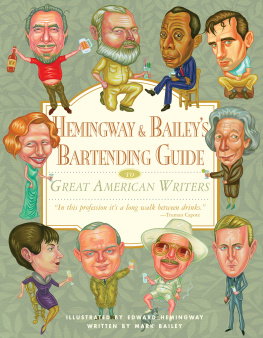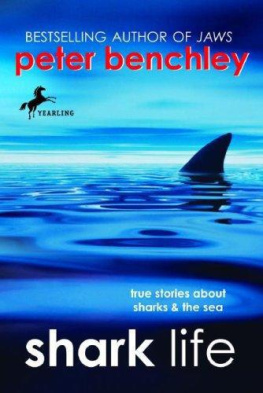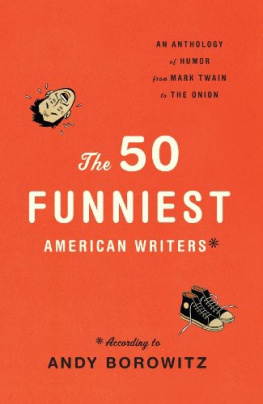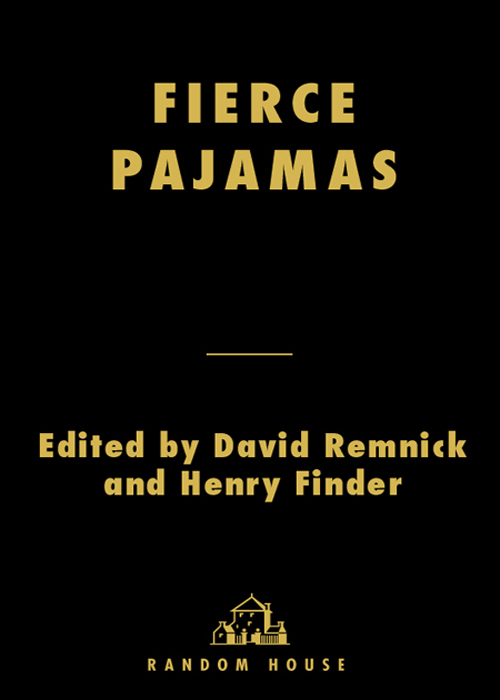
SPOOFS
NOTES ON CONTRIBUTORS
WOODY ALLEN (b. 1935) was nominated for an Emmy as a writer for Sid Caesars television show before becoming famous as a standup comic. He is now best known as the writer and director (and often star) of dozens of movies, including such classics as Annie Hall, Manhattan, and Hannah and Her Sisters. He has contributed to The New Yorker since 1966.
MARTIN AMIS (b. 1949) won the Somerset Maugham Award for his first novel, The Rachel Papers. His novels include Money, London Fields, and Times Arrow. His memoir, Experience, was published in 2000.
ROGER ANGELL (b. 1920) has been a fiction editor at The New Yorker since 1956 and a contributor since 1944. He has been writing about baseball since 1962; his books include The Summer Game, Season Ticket, and A Pitchers Story: Innings with David Cone.
MICHAEL J. ARLEN (b. 1930) was the magazines television critic in the 1960s and 1970s. He is the author of a novel and seven books of nonfiction, including Living-Room War, an examination of television reportage. In 1976, he won the National Book Award for Passage to Ararat.
W. H. AUDEN (19071973) was born in York, England, was educated at Oxford, and achieved fame as a poet in the 1930s. In 1939 he immigrated to the United States, and published his first poem in The New Yorker. He was a frequent book reviewer in the 1950s and 1960s. He won a Pulitzer Prize in 1948 for The Age of Anxiety and the National Book Award in 1956 for The Shield of Achilles.
DONALD BARTHELME (19311989) published 128 stories in The New Yorker over twenty-six years, as well as film reviews, Notes and Comment, and parodies appearing under the pseudonym William White. He grew up in Houston and worked there first as a reporter for the Houston Post, then as the director of the Contemporary Arts Museum. He moved to Manhattan in 1963. He was regarded as one of the most innovative writers of his generation. His collection Sixty Stories was a PEN/Faulkner Award finalist in 1982.
NOAH BAUMBACH (b. 1969) wrote and directed the films Kicking and Screaming and Mr. Jealousy.
LUDWIG BEMELMANS (18981962) was born in the South Tirol, at that time part of the Austro-Hungarian Empire. He worked in hotels and restaurants from the age of fourteen, first in Europe and then in New York, and at one time part-owned a restaurant called the Hapsburg House. His writings for The New Yorker, mostly humorous memoirs, began appearing in 1937, and he also produced many covers for the magazine. His books include novels, travelogues, and memoirs, and he worked briefly as a screenwriter. His art was exhibited in New York and Paris; his murals can still be seen in New Yorks Carlyle Hotel. He is now best remembered for the Madeline childrens books, the first of which was published in 1939.
ROBERT BENCHLEY (18891945) was born in Worcester, Massachusetts. He was the editor of the Lampoon while at Harvard, and went on to work at Life and Vanity Fair. One of the wits of the Algonquin Round Table, in the early 1920s, he developed his famous Treasurers Report monologue for a stage review; he performed it throughout his life onstage, and also in one of the first short films with sound, in 1928. He wrote for The New Yorker from 1925 to 1940, providing theater reviews, the Wayward Press column, and many humor pieces. He was also a popular radio broadcaster, and appeared in forty-eight short films, including the Oscar-winning How to Sleep (1935).
ELIZABETH BISHOP (19111979) grew up wealthy but parentless in Nova Scotia and Worcester, Massachusetts. After graduating from Vassar, she traveled, living first in Key West, then in Mexico. Her first poem in The New Yorker appeared in 1940. For most of the 1950s and 1960s, she lived with her partner, Maria Carlota Costellat de Macedo Soares, near Rio de Janeiro. She won a Pulitzer Prize in 1956 for Poems: North & SouthA Cold Spring and was elected to the American Academy of Arts and Letters in 1976.
ROY BLOUNT, JR. (b. 1941) grew up in Georgia. In addition to several books of comic essays, he is the author of a novel and a book about the Pittsburgh Steelers. He has been an editor at Sports Illustrated and a screenwriter, read his stories and poems on public radio, and designed word puzzles for the now defunct Spy magazine.
ANDY BOROWITZ (b. 1958) is the creator and producer of the television series The Fresh Prince of Bel-Air and a co-producer of the film Pleasantville. His books include Rationalizations toLive By and The Trillionaire Next Door. He is a commentator on National Public Radios Weekend Edition.
MARSHALL BRICKMAN (b. 1941) was a member of the folksinging groups the Journeymen and the Tarriers before becoming a writer for CandidCamera and The Tonight Show. He collaborated with Woody Allen as a writer on several films, sharing the Oscar for Annie Hall, and went on to write and direct a number of feature films, including Simon and The Manhattan Project.
DAVID BROOKS (b. 1961) is a senior editor at The Weekly Standard and the author of Bobos in Paradise: The New Upper Class and How They Got There.
CHRISTOPHER BUCKLEY (b. 1952) is the editor of Forbes FYI. He is the author of eight books, including Thank You for Smoking, Wry Martinis, and Little Green Men.
FRANK CAMMUSO (b. 1965), a political cartoonist, and HART SEELY (b. 1952), a reporter, are writing partners whose comic articles have appeared in The New York Times and the Syracuse Herald-Journal;2007-Eleven and Other American Comedies is a collection of their pieces.
CLARENCE DAY (18741935) was born into an affluent New York family and began a career as a stockbroker. He turned to writing after being partially disabled by rheumatoid arthritis, eventually working entirely from his bedroom. Great success came in the early 1930s, with comic memoirs of family life. These pieces ran in


